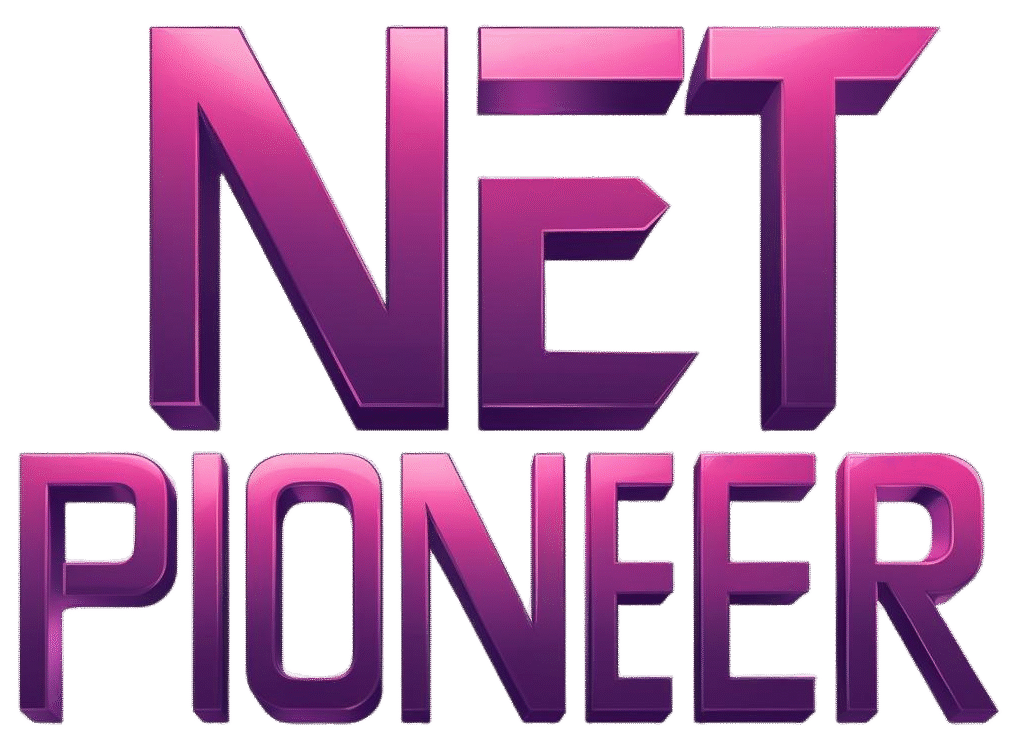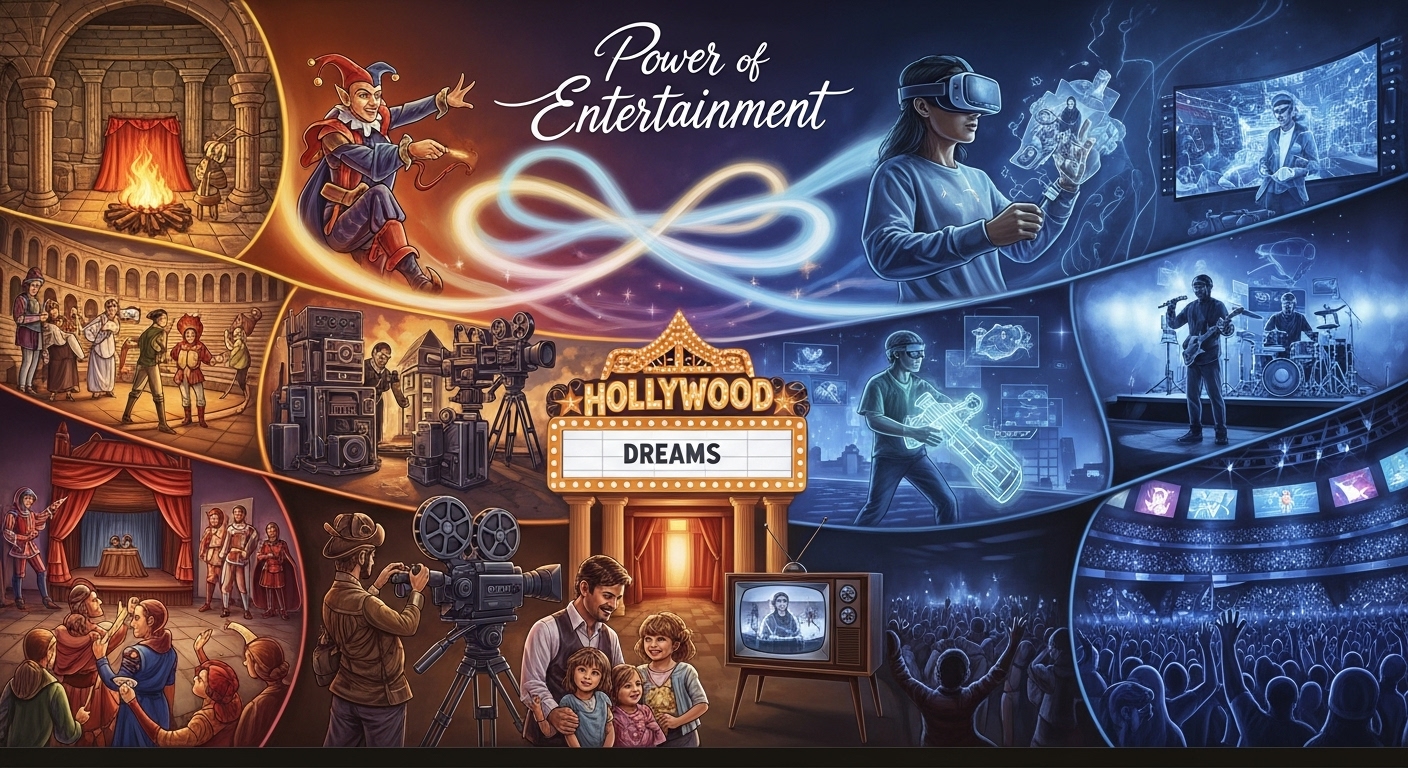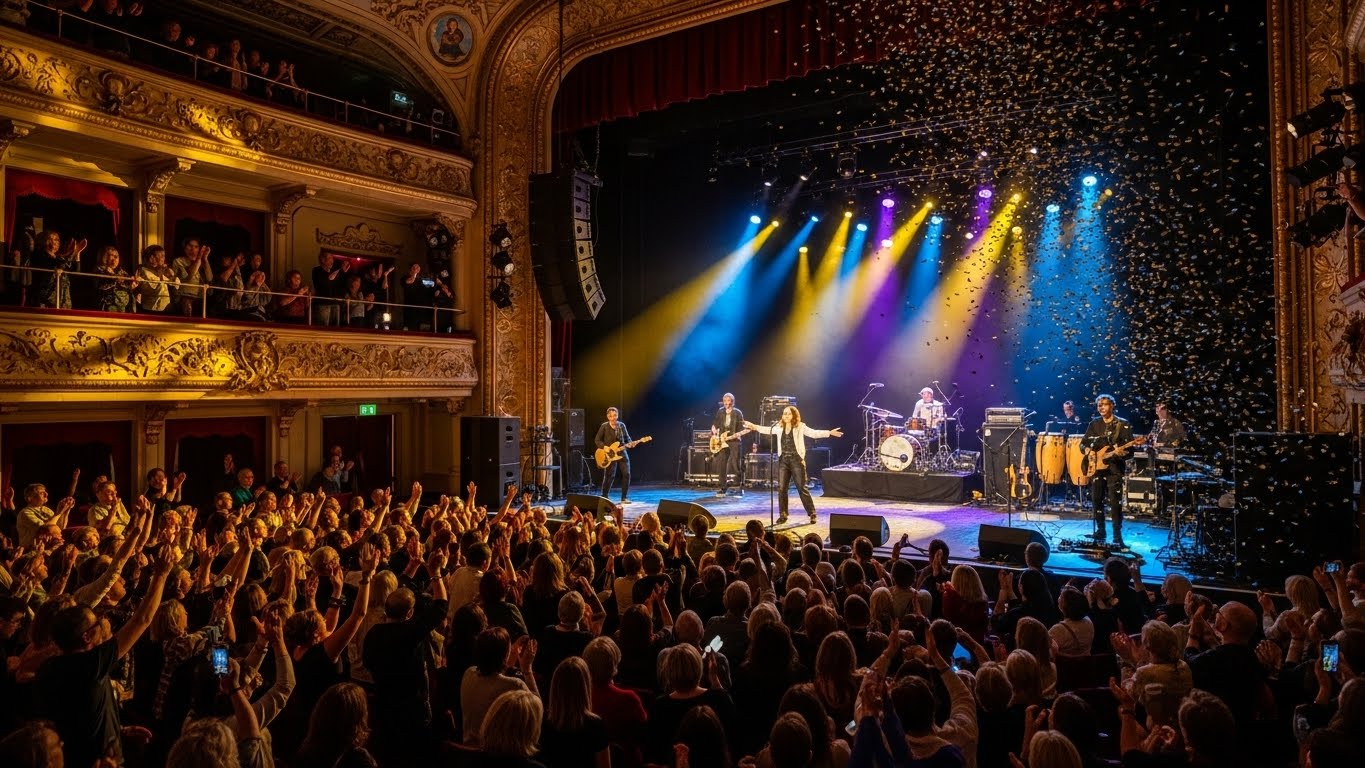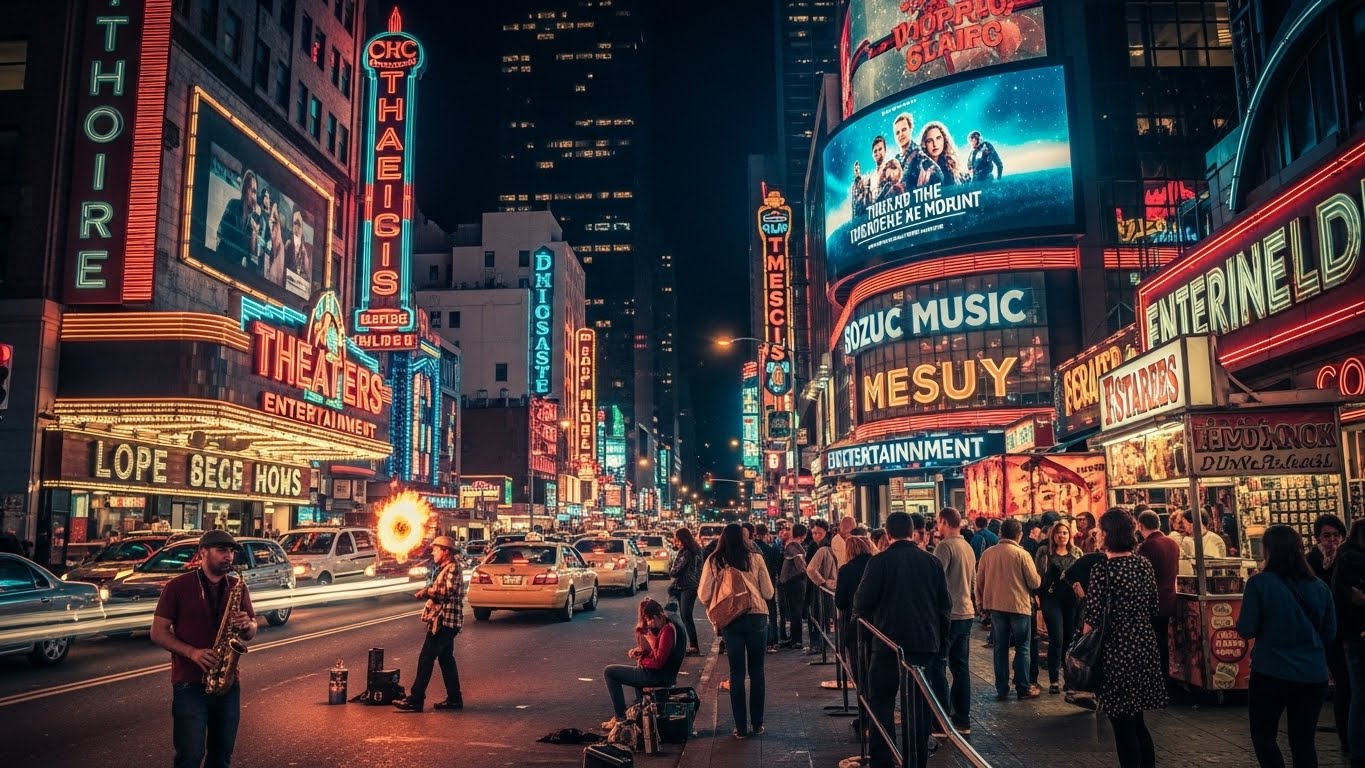Entertainment is not just an industry; it is a pulse that beats in every corner of human life. From the laughter that erupts during a comedy show to the goosebumps one feels in a suspenseful movie, entertainment holds the power to move people in ways nothing else can. It is more than an escape from reality; it is a mirror reflecting human emotions, dreams, struggles, and triumphs. Over the decades, entertainment has transformed dramatically, influenced by technology, creativity, and social change. Yet, its core essence remains the same—to evoke feelings, tell stories, and bring people together.
The Meaning and Essence of Entertainment
At its heart, entertainment is the art of engaging people emotionally, mentally, or visually. It can take countless forms—music, cinema, theater, television, sports, literature, or digital content. The beauty of entertainment lies in its diversity; there is something for everyone. A child watching an animated movie, a teenager attending a concert, an adult reading a novel, or an elderly person enjoying a radio drama—all experience joy in different yet equally powerful ways.
Entertainment also serves as a universal language. Regardless of cultural differences, people can connect through stories, songs, or visuals. A Bollywood film can make audiences in Africa dance, while a Korean drama can bring tears to someone in Europe. This shared human experience is what makes entertainment one of the most unifying forces in the world.
The Evolution of Entertainment Through the Ages
The story of entertainment stretches back to ancient civilizations. In the early days, entertainment was deeply connected to rituals, myths, and storytelling. People gathered around fires to listen to tales of heroes, gods, and spirits. Ancient Greeks performed plays in open-air amphitheaters, combining drama with philosophy. Roman gladiatorial games entertained masses, while medieval Europe saw the rise of minstrels and jesters who traveled from town to town performing songs and stories.
With the invention of the printing press, literature became more accessible, and books began shaping minds and cultures. The 19th and 20th centuries marked the birth of modern entertainment—cinema, radio, and later, television. Each invention brought a new wave of excitement, connecting millions to stories and performances like never before. The arrival of the internet and digital media revolutionized entertainment once again, making it available anytime, anywhere, on any device.
The Magic of Cinema
Cinema is perhaps the most powerful form of storytelling in the modern world. It combines visuals, sound, performance, and imagination to transport audiences into entirely different realities. From silent films of the early 1900s to today’s high-tech blockbusters, the movie industry has grown into a global phenomenon.
Movies can inspire revolutions, challenge social norms, and give voice to the voiceless. A good film leaves an emotional imprint, often staying with the viewer long after the credits roll. Whether it’s the timeless romance of classic films or the adrenaline rush of modern action movies, cinema continues to captivate generations.
The rise of streaming platforms has further expanded the reach of films. People no longer need to visit theaters to enjoy new releases. With just a few clicks, they can access global cinema from their homes. This democratization of entertainment has made the movie experience more personal yet more universal than ever before.
Music: The Language of the Soul
If cinema is a visual art, music is an emotional one. It is a form of entertainment that transcends all boundaries of language and culture. A melody can make someone smile, cry, or remember moments from the past. Music connects humans to their emotions in the purest way possible.
From classical symphonies to modern pop beats, music has evolved alongside human civilization. It has served as a medium of protest, love, worship, and celebration. Even today, music remains an essential part of human expression. It plays in the background of our daily lives—while we travel, work, or relax. The digital age has given birth to new genres, artists, and collaborations that reach billions instantly.
Live concerts, music festivals, and award shows add another layer to the magic. The collective energy of people singing and dancing together creates a sense of unity and joy that words cannot describe. In every beat, music reminds us that entertainment is not just to amuse but also to connect souls.
Television and the Golden Age of Storytelling
Television once ruled the world of entertainment. Families would gather around the TV to watch their favorite shows together, turning it into a daily ritual. Sitcoms, dramas, news broadcasts, and talk shows became part of everyday culture. Television introduced memorable characters, iconic moments, and catchphrases that still echo in pop culture today.
Although streaming services have taken center stage, traditional television remains relevant. It continues to offer live broadcasts, reality shows, and sports that unite millions. Moreover, the rise of high-quality scripted series has brought about what many call the “golden age of television.” Shows with complex plots, stunning visuals, and deep character development have redefined storytelling, often rivaling big-budget films.
The Power of Theater and Live Performances
Before film and television, live performance was the primary form of entertainment. Theater, dance, and music performances allowed artists to connect directly with their audiences. Even today, live entertainment holds a unique charm that no screen can replicate. The immediacy, emotion, and unpredictability of a live performance create a special bond between the performer and the audience.
Broadway shows, stage dramas, and musical performances continue to draw huge crowds. From Shakespearean tragedies to modern musicals, theater remains a space for creativity, expression, and human connection. It teaches audiences empathy, imagination, and the beauty of being present in the moment.
Sports: The Entertainment of Passion and Competition
Sports are one of the most powerful forms of entertainment in human society. They combine physical skill, strategy, and emotion in a way that captivates millions. Whether it’s football, cricket, basketball, or tennis, sports ignite passion, pride, and excitement.
For many, sports are not just games—they are a way of life. Athletes become heroes, stadiums turn into temples of hope, and victories become moments of national pride. The thrill of competition, the unpredictability of results, and the shared experience among fans make sports a unique branch of entertainment.
Major tournaments and events bring the world together. People of all backgrounds cheer for their teams, creating a global celebration of unity and spirit. Sports, like all great entertainment, remind us that joy and connection are at the core of the human experience.
The Digital Revolution: A New Era of Entertainment
The 21st century has witnessed the most dramatic transformation in the history of entertainment. With the rise of smartphones, social media, and streaming platforms, content consumption has become personalized, instant, and global. Entertainment is no longer limited to television schedules or movie releases—it is available on demand.
Platforms like YouTube, podcasts, and social networks have given rise to a new kind of celebrity: the digital creator. Influencers, vloggers, and gamers have built massive audiences by sharing their creativity and personality online. This has made entertainment more democratic; anyone with talent and a camera can reach millions.
Virtual reality, artificial intelligence, and interactive storytelling are shaping the next generation of entertainment. Audiences are no longer passive viewers—they can now participate, create, and influence content. The boundaries between creators and consumers are fading, making entertainment more immersive and engaging than ever before.
The Psychology of Entertainment
Beyond fun and relaxation, entertainment plays a significant psychological role. It provides an escape from daily stress, offering a safe space to explore emotions and fantasies. Movies and books allow people to live different lives, while music helps regulate mood and express feelings.
Entertainment also helps people understand the world better. Through stories and performances, audiences can experience different cultures, perspectives, and challenges. It fosters empathy and awareness, shaping how people think and feel about society.
Moreover, entertainment influences behavior and trends. Fashion, language, and even social movements often begin within entertainment industries before spreading to the wider world. Celebrities and artists have become role models, shaping ideas about identity, success, and creativity.
Challenges in the Entertainment Industry
Despite its glamour, the entertainment world faces many challenges. The pressure to constantly produce new content can lead to burnout among creators. Issues like piracy, misinformation, and exploitation also threaten the industry’s stability. Additionally, the influence of social media can sometimes blur the line between entertainment and reality, affecting mental health and public trust.
Representation is another major issue. Entertainment has a responsibility to reflect the diversity of the real world. Progress has been made, but there is still much work to ensure that voices from all backgrounds, genders, and identities are heard and respected.
The Future of Entertainment
As technology evolves, the future of entertainment looks both exciting and unpredictable. Virtual concerts, holographic performances, and AI-generated art are already becoming realities. The integration of entertainment with daily life—through wearable devices, smart homes, and virtual worlds—will continue to grow.
However, one thing will never change: the human need for stories and emotions. No matter how advanced technology becomes, entertainment will always be about connecting people and touching hearts. The tools may change, but the purpose remains timeless.
The future may bring unimaginable forms of entertainment—fully immersive virtual realities or AI-driven narratives—but the essence of joy, laughter, and inspiration will stay. Humanity’s desire to dream, imagine, and celebrate life ensures that entertainment will continue to evolve while keeping its emotional core alive.
Conclusion: The Endless Magic of Entertainment
Entertainment is more than movies, music, or games—it is a reflection of human creativity and emotion. It captures the spirit of who we are and what we aspire to be. Whether through laughter, tears, rhythm, or drama, entertainment gives meaning to moments and memories to cherish.
From ancient storytellers to digital creators, from theater stages to virtual screens, the journey of entertainment continues endlessly. It is the thread that connects generations, cultures, and hearts across the globe. In its many forms, entertainment reminds us that no matter how complex life becomes, there will always be room for imagination, joy, and the shared experience of being human.
The world may change, technology may evolve, but the need for entertainment will remain eternal. It is not just an escape from life—it is life itself, painted with the colors of creativity, emotion, and connection.



